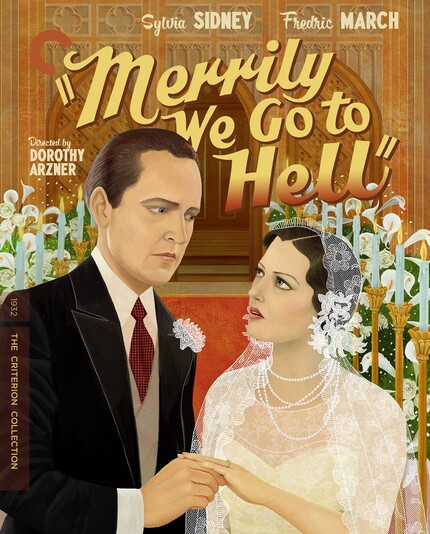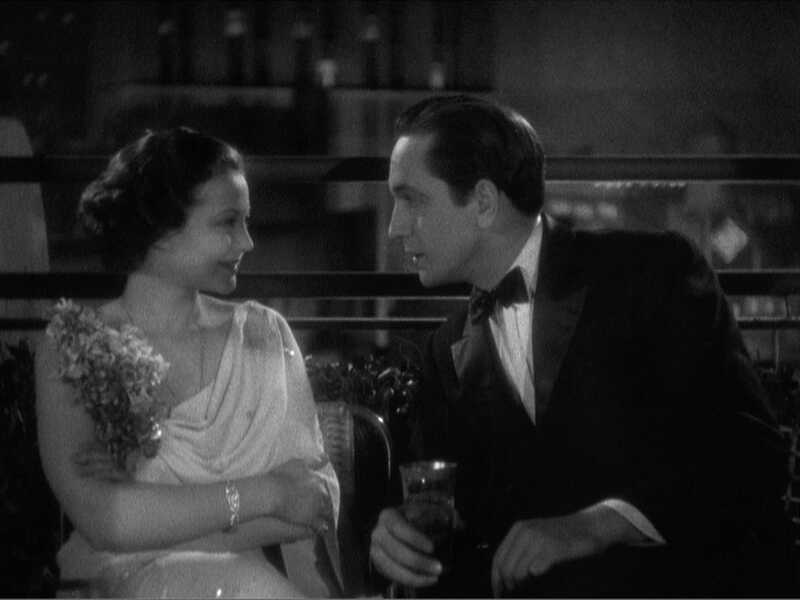Blu-ray Review: Criterion Toasts Arzner with MERRILY WE GO TO HELL

Too many of the women who made their mark in the early years of cinema have been forgotten; lost to time, lack of proper archiving, and sexism, we know at least from some sources that women contributed to vitrually all fields of cinematic creation. As well, due to the power of the Hays Code over the early years of sound pictures, we tend to think of early black and white films as being rather chaste in outlook and situation. Happily, on both fronts, Criterion has issued its second film directed by Dorothy Arzner, Merrily We Go to Hell (1932). Arzner was the only women director working in Hollywood in this decade, and this film, a story of love, betrayal, alcoholism, polyamory, and hedonism was both a product of its time and part of the reason for the creation of the Hays Code.
There were a brief few years between the rise of 'talkies' in the late 1920s, and the arrival in the USA of the Hays Code (1934), the rules of which barred event the suggestion of certain acts of situations. Merrily We Go to Hell might at first seem like a dramedy about a man struggling with addiction despite the loving attentions of a beautiful young (and rich) woman, but within it is a whole world of trouble for both protagonists, a reflection of an era in which the decadent lifestyles of the rich and privileged were under scrutiny. Arzner, a keen observer of these lifestyles, breathes life into a story of two people whose love for each other may not be outweighed by the allure of a more 'free' and open lifestyle.
Jerry (Fredric March) is a journalist, and drunkard; his career has at least given him a 'high class drunk' status as he's able to mingle at parties, or hide behind a row of bottles. This is where he meets Joan (Sylvia Sidney), the young, effervescent daughter of an millionaire industrialist. On a balcony overlooking the lights of Chicago, they are instantly smitten. It's a bumpy courtship, as Jerry just can'et let go of drinking; the wedding barely happens, and once Jerry finds success as a playwright, his eye wanders. But rather than leave him, Joan decides she can 'wander' as well, and thus begins a thoroughly modern marriage.
Filmed in the last months of prohibition, the alcohol flows freely; and since it was before the Hays Code, while there is still only the suggestion of sex, the suggestion of it is clear, not only between husband and wife, but in what becomes their open, polyamourous marriage. The script by Edwin Justus Mayer (adapted from a novel) is quick-witted and biting; the pace keeps a steady clip, and we're easily drawn into both of these characters, at once wanting to scream at Jerry to get himself together, and at Joan to run for the hills. And yet, it's hard not to want them to be together. Jerry's infidelities are a symptom of his alcoholism, while Joan's are merely a cover for her broken heart. Can love save the day?
Arzner's skills as a director are on full display in this film, in particular her sense of space, her blocking techniques, and her work with actors. This really is a 'talkie', with the actors quipping their lines (and just about all of them), filled with spice, double entendres, pathos, and deeper meaning. Working with renowned cinematographer David Abel, Arzner knows when to place the camera on the lovebirds, framing their conversations as, at times a beautiful bubble, other times a prison. Even in larger spaces, the actors take the focus, though the background is noticeable in how it enhances each scene, be it Joan's family mansion, the church that hosts their rather awkward wedding, or the tiny apartment which is all the newlyweds can afford.
This was one of four films that March made with Arzner, and it's obvious that they had a terrific director-actor rapore; March has to walk a fine line between charming and ugly, sympathetic and disagreable. This wasn't Sidney's first role as an heiress, or someone in an unusual relationship, but Arzner highlights her natural charm, and counteracts her diminutive size by showing how big her love for her husband is; even as we see her makes some bad decisions, we want her to be happy, and Sidney is captivating.
It's amazing how a film that's almost 100 years old can be both very much of its time, and also still be dealing with very relevant issues; this is the peronal politics, of love, commitment, and the shape they take; each couple must find their own rhythm and style, but it's often love that ends up truly conquering all.
SPECIAL FEATURES
As usual, Criterion's restoration work is terrific; the 4K digital transfer makes the film look as good as new, while still retaining that 'vinyl' quality, along with an uncompressed soundtrack. The paper insert opens to a lovely essay by Judith Maybe, 'Gingerbread, Cake, and Crème de Menthe'; it's a great overview of the film that delves into aspects of the film such as the film in context of Arzner's career, the actors, and the, at the time, controversial subject matter (though best to read it after watching the film if you want to avoid spoilers).
There is a rather rushed video essay by film historian Cari Beauchamp; not lacking in terms of quality, but trying to get a lot of information in to a short time, Beauchamp narrates perhaps a bit too quickly, but it's a decent introduction to Arzner. A 1983 German documentary takes its time a bit more; filmed in part around Arzner's final home in Palm Springs, it includes interviews with friends, biographers, and actress Esther Ralston. It's an interesting look not only at Arzner from both a political and personal perspective, but a memento of a piece that was instrumental in bringing forward to prominence, the existence, and history, of early women filmmakers.








